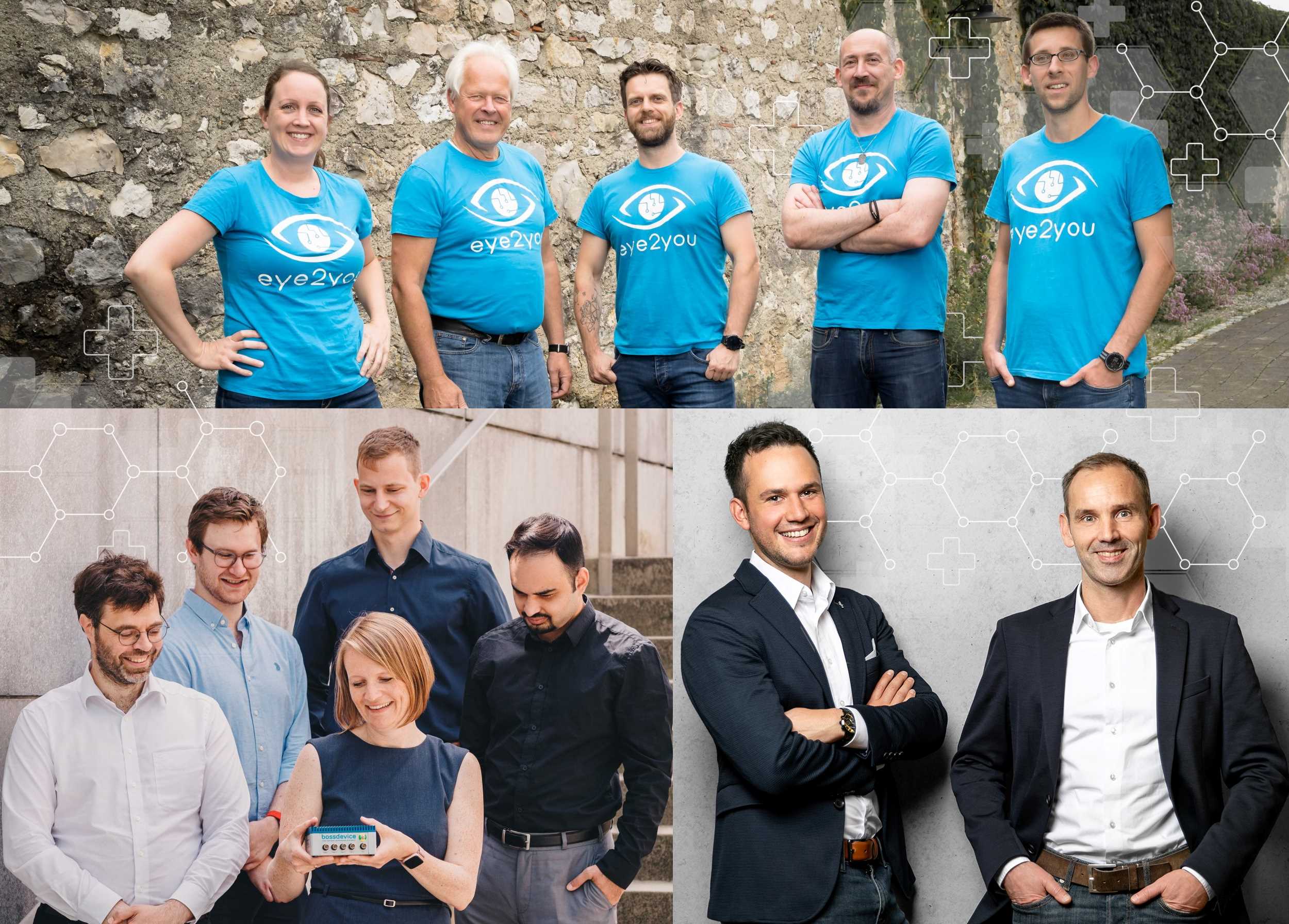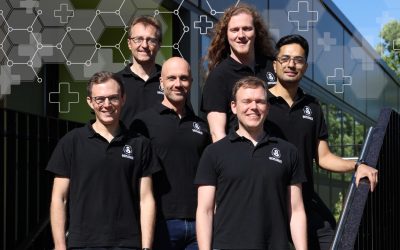In most cases, distributors of medical devices or in vitro diagnostics need a certified Quality Management System – QMS for short. The development and establishment of QMS pose new challenges, especially for startups. Not only personnel and monetary resources are limited. As a newcomer to the world of regulation, you often cannot see the forest for the trees. We talked to startups that are overcoming this hurdle in very different ways: sync2brain, eye2you, AIRAmed und Inovedis.
Do it yourself!
 Low budget, sustainable, but time and labor intensive is the do-it-yourself way. The startup sync2brain, whose software-based solution enables the personalization of transcranial magnetic stimulation, is taking exactly this approach.
Low budget, sustainable, but time and labor intensive is the do-it-yourself way. The startup sync2brain, whose software-based solution enables the personalization of transcranial magnetic stimulation, is taking exactly this approach.
For Ramona Samba, CEO of sync2brain, one thing is clear: “The topics of QM and regulation as a whole are so central to the health care sector that you have to build up the expertise for them within the company. From the very beginning, there must be one person in the team who focuses on this.” For sync2brain, a team member was found who did not have any professional regulatory experience, but who had passion and ambition for the topic itself.
Building up know-how without the corresponding experience up to the implementation of the first documents takes a lot of time. The advantage, however, is that someone new does not yet have any prefabricated schemes in his head and can devote himself freely to building up a new company. The cost factor should also not be underestimated: established QM experts demand a significantly higher salary than newcomers.
However, the implementation of a QMS does not remain the sole responsibility of this one team member. The management and the core team also have to deal with regulatory issues. For Ramona as CEO of snyc2brain, this means that about a third of her time goes into this: Reading literature, researching, transferring to the own case and writing documents. For her, however, this is not a disadvantage, as no business process, especially management, can be separated from regulatory. “If we put more time and work into Regulatory at the beginning, it will be all the easier later on. Because then we’ve worked out every step ourselves once and the expertise stays in the team.” This is advantageous both in the short term, as one becomes more agile. There is always a sparring partner on site if questions arise that need to be discussed ad hoc. And in the long term, too, you are well positioned when it comes to developing new products, for example.
Currently, the sync2brain team relies only selectively on external support, for example in the form of templates, document reviews or advice on specific questions. Due to the own expertise, support offers can be used in a very targeted manner – this also saves costs – and advice can be better assessed.
„Every part of this journey has been important.“
The high time investment for building up in-house expertise gets compensated on the one hand by cost savings in personnel and consulting. On the other hand, by building a solid, sustainable foundation for a company’s future. At sny2brain, both certifications – that is certification of their QMS according to ISO 13485 and product approval through CE marking – are planned for the end of the year. If these milestones are achieved, their DIY journey of a year and a half was faster than it might seem at first glance.
What you should consider
- Establish Regultory Thinking® as a team mindset, e.g., by anchoring regulatory in the agenda of every team meeting and having the management and core team deal with the literature themselves!
- Everyone can understand Regulatory, so don’t be shy!
- Designate a regulatory-focused team member from the start!
- Filling this position is key. Whether a new or existing team member, look for attention to detail, a passion for working with regulatory literature, and an interest in the product itself when staffing!
- For countered cases, rely on selective external consulting or assistance, such as templates or reviews!
Getting an QM-expert on the team
 Less labor-intensive and time-consuming, just as sustainable, but more expensive, is getting a person with professional regulatory experience on board. This is the way chosen by the startup eye2you , whose smartphone-based solution makes retinal screening possible in just a few minutes.
Less labor-intensive and time-consuming, just as sustainable, but more expensive, is getting a person with professional regulatory experience on board. This is the way chosen by the startup eye2you , whose smartphone-based solution makes retinal screening possible in just a few minutes.
Whether you build a QMS from internal resources or with the help of external consultants, you always need one person in the team who is committed to this topic and, above all, “is up for it,” says Philipp Lies, CEO and CO-Founder of eye2you. However, this person was missing from the team. At the same time, the startup was under time pressure and could not have waited for a regulatory newbie to get up to speed. Therefore, it was clear to the team, they do not want to work with consultants, but hire a person with experience to take over the mountain of operational work independently.
Bringing someone with experience into the team has the advantage that they do not have to familiarize themselves with the world of regulation, but can productively build a QMS from day one. In the meantime, the rest of the team can fully focus on their areas of expertise. For this purpose, eye2you’s QM-expert conducts interviews with the team members about their activities and the startup’s processes and independently translates their input into documents. In the short term, this brings a clear time advantage. Similar to the DIY variant, you also have the long-term advantage that the expertise remains in the team and you always have a sparringpartner for regulatory topics on site.
While a regulatory newbie approaches the business process without a prefabricated scheme, someone with experience comes with an already existing system and may find it more difficult to adapt to the specifications and processes lived in the startup. Plus, you have to dig deeper into your pocket for experience.
„From our perspective, this was the most effective way to go.“
While eye2you landed a lucky strike with its new team member, finding the right person can become a sticking point. You have to find someone who not only has regulatory experience but can also cope with the dynamic startup world and is content with a lower salary compared to established companies. By startup standards, you still need more budget for such a person, but the time savings definitely make up for that, says Philipp.
What you should consider
- Also here, the filling of the position is central. Therefore, in addition to the fit into the team, make sure that there is a high level of experience in the regulatory field as well as with the startup world!
- Get competent support during the recruitment process in order to better assess the regulatory expertise of the candidates!
- Even if it is only enough for a part-time employee, expand your team as soon as budget is available! This will help avoid initial mistakes that will be costly to iron out later.
- Be prepared to spend more money than usual for a startup to fill this position with an experienced person.
Obtaining external advice
 Fewer team resources are required, if the support of external consultants is obtained on a larger scale on the way to QMS. This is the approach taken by the startup AIRAmed, which develops software solutions for the early detection of neurodegenerative diseases.
Fewer team resources are required, if the support of external consultants is obtained on a larger scale on the way to QMS. This is the approach taken by the startup AIRAmed, which develops software solutions for the early detection of neurodegenerative diseases.
For Christiane Lindig, COO of AIRAmed, regulatory affairs is also one of the central topics as a company in the health care sector. There are two reasons why the team – unlike sync2brain or eye2you – relied on external expertise to set up their QMS and technical documentation. Firstly, their mindset: the team always relies on external support when there is not enough know-how available internally for important topics. Secondly, the startup was under time pressure: “Time was breathing down our necks from the very beginning, after we knew that we could only certify to MDD until the end of 2019. No one could tell us when certification according to MDR would otherwise be possible again. So, we did everything we could to develop our product and set up the documentation in six months.”
To ensure that this milestone could be reached with certainty by the deadline, the startup purchased templates, which were then filled out by the team itself and plausibility checked by their consultant. They even outsourced the clinical evaluation of their product entirely to the service company.
„Especially as a startup, time is short everywhere anyway.“
For AIRAmed’s team, this way had only advantages and they would take it again anytime, says Christiane. By working with external consultants, they reached the certification milestone in a short time. In parallel, the team was able continue with the development of the product and company. Today, AIRAmed still works closely with the service company and buys additional knowledge whenever necessary, even though they now have expertise on the team themselves.
Nevertheless, one thing is clear: As a startup, you first have to be able to find the budget for such comprehensive consulting. At the same time, there still must be a person in the team who can implement the advice and, at best, critically assess it. Because consultants are often trimmed to security – as our interviewees from sync2brain and Inovedis report – while as a startup you also have to take risks sometimes.
What you should consider
- Talk to several providers to get a feeling for their offers and working methods!
- The right consultant is crucial. You and your startup should always feel uplifted and expertly advised.
- Communicate problems when working together! Because even as a startup, you pay for a very good service and are entitled to it.
- If it does not fit at all: Have no inhibitions to change the consultant or the services company!
- Develop an awareness of how much support your startup actually needs and where you can rely on own experience!
- Determine a responsible team member even when working with external consultants!
Not becoming a legal manufacturer
 For certain business models and/or products, it can make sense not to become a legal manufacturer yourself, but to outsource this role entirely to development partners. This is the approach taken by Inovedis. The startup has developed a novel implant system that enables a greatly simplified surgical technique.
For certain business models and/or products, it can make sense not to become a legal manufacturer yourself, but to outsource this role entirely to development partners. This is the approach taken by Inovedis. The startup has developed a novel implant system that enables a greatly simplified surgical technique.
In the case of Inovedis, there are two reasons for choosing this way, explains Lukas Flöß, CEO and Co-Founder: first, the team has little experience with regulatory, which – especially for a risk class 2b product like this – is very complex and extensive. Secondly, the team is planning the exit. This is because their product encounters a huge market with established players. Speed and quality are what count here. Therefore, it was important to make the project easier to plan and to reduce risk
This is where development service providers come in. These offer innovators a complete package for the implementation of their ideas, from product development to market launch. “In our case, the development was largely complete,” says Lukas. The service company then dedicated itself to the regulatory part – that is, setting up a QMS, creating the technical documentation and taking on the role of the legal manufacturer. Depending on the sales figures, this role can be taken over at any time.
The advantage of this approach is that such service providers bring with them know-how and a team that would be difficult to build up quickly on one’s own. In addition, they take over all regulatory activities and are not only available as advisors. Such a cooperation not only creates a time advantage, but also makes the way to the certification of the QMS and the product more predictable – thanks to agreed timelines and targets. For example, development, supply chain set-up and technical documentation together took Inovedis just one year.
At Inovedis, the collaboration with its external partners is very close and successful. “Of course, that can also go differently,” Lukas suspects. That’s why it’s important to arrange everything carefully and with foresight in advance. In addition, the cost factor should not be underestimated: outsourcing regulatory entirely is far more expensive than expanding the company’s own team accordingly.
„This way is more manageable and plannable.“
For the startup, meeting a tight schedule was the top priority. So, they are very happy with their decision to outsource the regulatory part: “We are working within the schedule, without delay and without much cost overrun,” says Lukas.
What you should consider
- Finding the right partner is crucial. Therefore, pay attention to professionalism, their experience and way of working!
- Work closely together – your startup and your development partners are one team!
- Ensure the commitment of your partners, e.g., by giving them small shares or investing themselves.
- Draw up contracts carefully and with long-term goals in mind! If you do not have your own know-how, you should get competent support.
Which is the right way for your startup?
Whether you build up expertise in your team or bring it in, get support from consultants or even outsource the area entirely, “in the end, regulatory is always expensive,” as Philipp from eye2you aptly points out. You and your team need to consider: What goals do we want to achieve? How and by when do we want to achieve them? Which advantages do we want to profit from? Which disadvantages can we live with?
We at MII support your startup to find the right way. Tailored to the individual status and goals of your startup, we accompany you and your team on the way to certification – through workshops, templates, help with recruiting, interim management and more.





